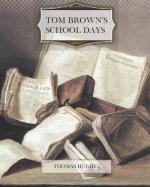canal, in defiance of Charity; and between them, after
a whole afternoon’s popjoying, they had caught
three or four small, coarse fish and a perch, averaging
perhaps two and a half ounces each, which Tom bore
home in rapture to his mother as a precious gift, and
which she received like a true mother with equal rapture,
instructing the cook nevertheless, in a private interview,
not to prepare the same for the Squire’s dinner.
Charity had appealed against old Benjy in the meantime,
representing the dangers of the canal banks; but Mrs.
Brown, seeing the boy’s inaptitude for female
guidance, had decided in Benjy’s favour, and
from thenceforth the old man was Tom’s dry nurse.
And as they sat by the canal watching their little
green-and-white float, Benjy would instruct him in
the doings of deceased Browns. How his grandfather,
in the early days of the great war, when there was
much distress and crime in the Vale, and the magistrates
had been threatened by the mob, had ridden in with
a big stick in his hand, and held the petty sessions
by himself. How his great-uncle, the rector,
had encountered and laid the last ghost, who had frightened
the old women, male and female, of the parish out
of their senses, and who turned out to be the blacksmith’s
apprentice disguised in drink and a white sheet.
It was Benjy, too, who saddled Tom’s first pony,
and instructed him in the mysteries of horsemanship,
teaching him to throw his weight back and keep his
hand low, and who stood chuckling outside the door
of the girls’ school when Tom rode his little
Shetland into the cottage and round the table, where
the old dame and her pupils were seated at their work.
Benjy himself was come of a family distinguished in
the Vale for their prowess in all athletic games.
Some half-dozen of his brothers and kinsmen had gone
to the wars, of whom only one had survived to come
home, with a small pension, and three bullets in different
parts of his body; he had shared Benjy’s cottage
till his death, and had left him his old dragoon’s
sword and pistol, which hung over the mantelpiece,
flanked by a pair of heavy single-sticks with which
Benjy himself had won renown long ago as an old gamester,
against the picked men of Wiltshire and Somersetshire,
in many a good bout at the revels and pastimes of the
country-side. For he had been a famous back-swordman
in his young days, and a good wrestler at elbow and
collar.
Back-swording and wrestling were the most serious
holiday pursuits of the Vale—those by which
men attained fame—and each village had its
champion. I suppose that, on the whole, people
were less worked then than they are now; at any rate,
they seemed to have more time and energy for the old
pastimes. The great times for back-swording came
round once a year in each village; at the feast.
The Vale “veasts” were not the common
statute feasts, but much more ancient business.
They are literally, so far as one can ascertain, feasts
of the dedication—that is, they were first
established in the churchyard on the day on which
the village church was opened for public worship, which
was on the wake or festival of the patron saint, and
have been held on the same day in every year since
that time.




